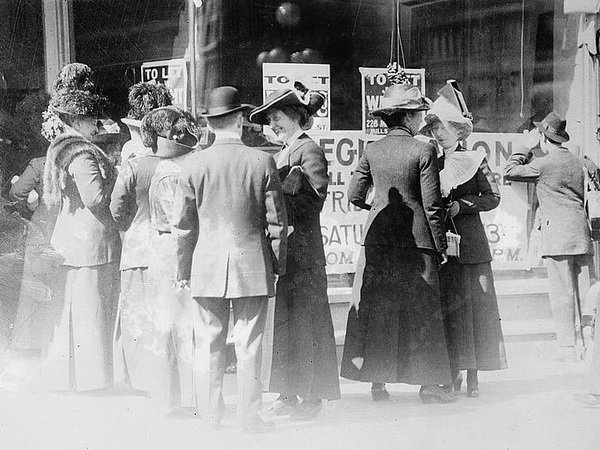1776
At the time of the signing of the Declaration of Independence, free white male property owners have the right to vote unless they are members of certain religious groups.1810
Religious affiliation is eliminated as a voting requirement.1855
Connecticut is the first state to enact a literacy test requirement to vote.1866
U.S. citizenship—but not suffrage—is granted to native-born Americans.1869
U.S. Congress passes the Fifteenth Amendment (on Feb 26th, 1869) granting suffrage to African American men. The state of Wyoming grants women the right to vote in all elections.1870
The Fifteenth Amendment—granting suffrage to African American men—is ratified on Feb 3rd, by three-fourths of the states.1882
The Chinese Exclusion Act denies U.S. citizenship and the right to vote to Chinese American.1890-96
A number of states in the north and south introduce literacy tests as a voting requirement. Numerous states enact literacy tests as a voting requirement. Not only Southern states enact this type of restriction. The tests also exclude uneducated whites from voting. “Grandfather clause” laws, allowing only those citizens whose grandfathers had voted before 1870 the right to vote, are passed in several states.1920
The Nineteenth Amendment grants women the right to vote.1924
The Indian Citizenship Act gave the right of citizenship to Native Americans who were born in the United States. Individual states, however, could still deny them the right to vote.1940
Southern states record that only three percent of African American citizens are registered to vote. The Civil Rights Act of 1957 gives the U. S. Department of Justice the right to initiate lawsuits on behalf of African Americans denied the right to vote.1960
The Civil Rights Act of 1960 grants African Americans the ability to register to vote at a federal court if they have previously been denied the right to register.1961
The Twenty-third Amendment grants District of Columbia residents the right to vote in presidential elections.1964
The Twenty-fourth Amendment declares the use of poll taxes unconstitutional in presidential and congressional elections. The Civil Rights Act of 1964 passes. The Act declares that a person may not be discriminated against based on gender, religion, race, and nationality.1965
The Voting Rights Act of 1965 is signed by President Lyndon B. Johnson declaring that the national government would take immediate action against any unconstitutional acts that limit minority group voting rights. The act also declares that literacy tests are unconstitutional.Sources
https://www.civiced.org/voting-lessons/voting-timelinehttps://tag.rutgers.edu/wp-content/uploads/2014/05/suffrage-by-state.pdf
Women's suffrage by State

Registering women in San Francisco 1911 (LOC, LC-DIG-ggbain-11215)
The following territories provided full voting rights to women before statehood:
1869 Territory of Wyoming 1870 Territory of Utah 1883 Territory of Washington 1887 Territory of Montana 1913 Territory of Alaska
The following states granted women the right to vote prior to the 19th Amendment:
1890 Wyoming 1893 Colorado 1896 Utah, Idaho 1910 Washington 1911 California 1912 Arizona, Kansas, Oregon 1914 Montana, Nevada 1917 New York 1918 Michigan, Oklahoma, South Dakota
In these states women could vote for President prior to the 19th Amendment:
1913 Illinois 1913 1917 Nebraska, Ohio, Indiana, North Dakota, Rhode Island 1919 Iowa, Maine, Minnesota, Missouri, Tennessee, Wisconsin
These states only allowed women’s suffrage after passage of the 19th amendment:
Alabama, Arkansas, Connecticut, Delaware, Florida, Georgia, Kentucky, Louisiana, Maryland, Massachusetts, Mississippi, New Hampshire, New Jersey, New Mexico, North Carolina, Pennsylvania, South Carolina, Texas, Vermont, Virginia, West Virginia